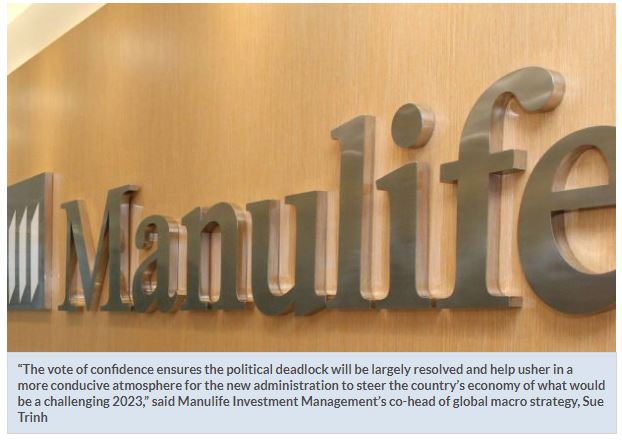Malaysia: Growth projected to normalise next year
PETALING JAYA: Analysts said the vote of confidence for Prime Minister Datuk Seri Anwar Ibrahim in Parliament helps to put in place a stable administration to address domestic issues such as the fiscal position of the government and meet the challenge of a weaker global economic outlook moving into 2023.
Manulife Investment Management said one of the key issues that many emerging markets like Malaysia had been confronted with in the past year was the sharp spike in the cost of living, partly as a result of the Russia-Ukraine conflict. This presented a huge issue for the countries’ fiscal policies.
“The vote of confidence ensures the political deadlock will be largely resolved and help usher in a more conducive atmosphere for the new administration to steer the country’s economy of what would be a challenging 2023,” said Manulife Investment Management’s co-head of global macro strategy, Sue Trinh, in the Asia investment outlook briefing yesterday.
Anwar gained the confidence motion through a voice vote in Parliament yesterday as the FBM KLCI closed 1.45 points lower at 1,477.
Trinh added Malaysia’s headline growth expansion in 2023 will be supported by domestic demand, specifically private consumption, as well as sufficient investment growth.
“Malaysia’s economic growth is expected to normalise next year. The country saw a very strong 2022 based on base effects. These base effects will work in the opposite direction heading into 2023, but nonetheless, growth will soften to around 4%, which is still a respectable performance.
“Moreover, Malaysia is also one of the markets that are most leveraged to China’s reopening from its exposure of goods, trade and tourism as well as the ongoing decoupling of global supply chains seen in China,” she said.
Trinh added Bank Negara’s gradualist approach in interest rate hikes has helped the economy to maintain a positive valuation from a macro perspective.
She warned the outlook for Malaysia may not be so conducive on the macro view point. However, investors should not lose sight of the bigger picture.
“For investors looking at the long term, there are likely more favourable conditions if and when global central banks’ cycles pivot towards a slightly softer position in the second half of 2023 (2H23).
“Similar to many central banks in the region, Bank Negara should reach a peak in its tightening cycle by the first quarter of 2023 (1Q23),” she said.
On a global scale, the economic slump is projected to become more apparent in 1H23, with a cyclical bottom likely to occur in 2Q23 or 3Q23.
Manulife expects global inflationary pressures to peak in 2H23 and give cover for the Federal Reserve to potentially ease monetary tightening in 4Q23.
Meanwhile, Manulife Investment Management head of client portfolio management, Asia and global multi-asset solutions, client portfolio manager Paul Kalogirou said the expected earnings downgrade that stem from higher inflation and interest rates in 2023 calls for investors to take on income-oriented strategies that have defensive attributes.
“Risk assets continued to move higher. We see enhanced yield opportunities in US high-yield and select US dollar-denominated emerging market (EM) debt. US high yield could generate solid yields, while there may be spread opportunities within EM dollar bonds given cheaper valuations,” he said.
He added that as we approach the final stages of the economic slowdown, selected government bonds and high-quality equities offered potential capital appreciation and dividends.
Source: https://www.thestar.com.my/business/business-news/2022/12/20/growth-projected-to-normalise-next-year


 Thailand
Thailand




